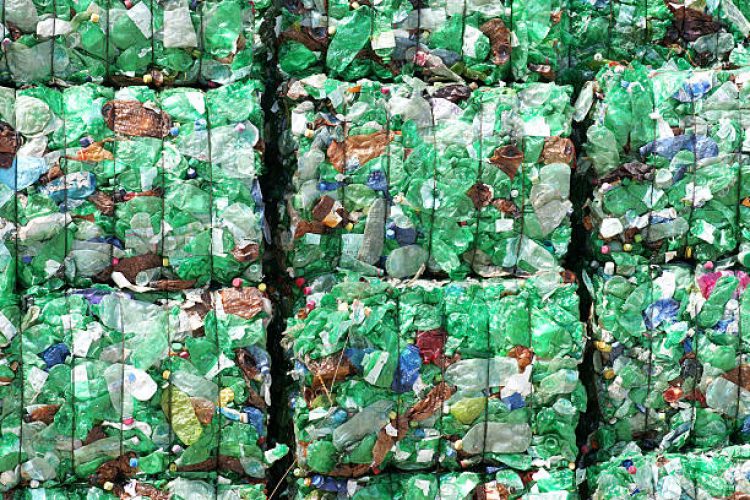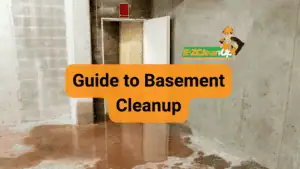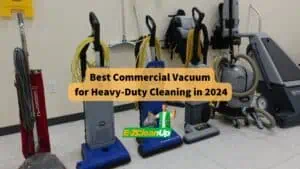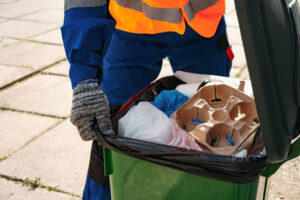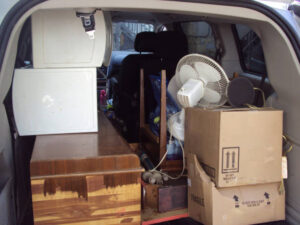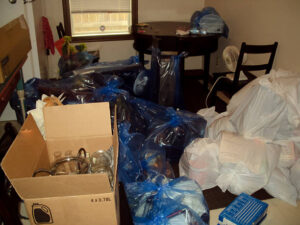Philadelphia’s waste management landscape is evolving rapidly, with the city investing $40 million in new recycling facilities and implementing stricter enforcement measures. For junk removal businesses operating in the City of Brotherly Love, understanding and obtaining proper licensing isn’t just a legal requirement—it’s a critical business strategy that can make or break your operation.
The Current State of Philadelphia’s Waste Management
Philadelphia generates massive amounts of waste annually. According to recent data, the United States produces 292.4 million tons of municipal solid waste annually, equivalent to 4.9 pounds per person per day. In Philadelphia specifically, the city pays Waste Management an average of $72.20 per ton to handle recyclables and $77.49 per ton for waste disposal.
The waste management industry nationwide is experiencing unprecedented growth. The global waste management market was valued at $687.30 billion in 2023 and is projected to reach $1,218.52 billion by 2030, representing a compound annual growth rate (CAGR) of 7.5%. This growth creates significant opportunities for licensed junk removal operators in Philadelphia.
Understanding Philadelphia’s Licensing Requirements
Core Business License Requirements
An Activity License is required for all businesses and non-profits operating in Philadelphia, including businesses located outside city limits but conducting business activities within the city. This fundamental requirement applies to all junk removal operations, regardless of size.
Dumpster and Vehicle Licensing
For businesses using dumpsters or specialized equipment, Philadelphia has specific requirements:
- Each dumpster must have a Radio Frequency Identification (RFID) medallion attached, provided by L&I when obtaining the license
- Dumpsters must display the license number and the name and telephone number of the licensee
- Applications are reviewed within five business days
Important Note About Waste Hauler Licensing
A significant development affects waste haulers in Philadelphia. Following a Commonwealth Court ruling, the Department of Licenses and Inspections is no longer licensing waste haulers and their vehicles, with a request to remove license requirements from the Philadelphia Code presented to City Council. However, this ruling applies only to licensing—all other code requirements for these businesses remain in effect.
The Financial Consequences of Operating Without Proper Licensing
Hefty Fines and Penalties
Philadelphia has dramatically increased penalties for illegal dumping and unlicensed operations:
- Minimum fines of $2,000 per offense, with maximum fines of $25,000 per offense when authorized by the General Assembly
- Current law allows fines up to $2,000 for illegal dumping without a vehicle, or up to $5,000 for dumping using a vehicle, regardless of dump size
- New legislation makes every individual large item of debris subject to maximum fines—meaning one load of 20 tires could cost liable parties up to $100,000
Real-World Case Examples
The city has taken aggressive enforcement action:
- One case involved a $400,000 fine plus $2,395 in cleanup costs for dumping 80 tires
- A waste hauler faced a $40,000 penalty, complaining the fine was disproportionately high compared to the roughly $1,800 cost of cleaning up debris
- In 2021, the Streets Department paid $8.3 million to remove 7,171 tons of illegally dumped materials plus 83,600 tires from 1,309 sites
Equipment Seizure Risk
The city may seize any dumpster located in the public right-of-way that is not validly licensed, with 24 hours notice if the owner can be identified. Seized dumpsters can only be recovered upon payment of seizure, transport, and storage costs plus a $1,500 fine.
Business Protection Through Proper Licensing
Insurance Requirements and Coverage
It’s important to carry junk removal business insurance and licensing, with average costs for $1 million general liability coverage ranging from $450 to $1,000 per year. Proper licensing often impacts insurance rates and coverage availability.
Legal Operation Standards
Licensed businesses demonstrate:
- Compliance with city regulations
- Professional credibility with customers
- Protection from civil and criminal penalties
- Ability to secure proper insurance coverage
Competitive Advantages
Licensed companies like EZ CleanUp advertise their compliance with state and federal regulations, displaying contractor’s license PA112494 and Philadelphia License 211715/36413, which provides competitive differentiation in the marketplace.
Industry Growth and Opportunity
Market Size and Potential
The junk removal industry is experiencing significant growth:
- The junk removal franchise market was valued at approximately $0.86 billion in 2024 and is expected to reach $2.45 billion by 2033
- Starting a junk removal business generally costs between $90,000-$150,000+, though it’s less expensive to start independently than purchasing a franchise
- The average profit range of a junk removal business is $65,000 to $85,000
National Waste Statistics
Understanding the broader market context:
- Of MSW generated nationally, approximately 69 million tons were recycled and 25 million tons were composted, totaling 94 million tons with a 32.1% recycling and composting rate
- About 146.1 million tons of MSW were landfilled in 2018
- The waste management and remediation services industry in the United States generated revenue of more than $145 billion in 2023
Best Practices for Philadelphia Junk Removal Licensing
Application Process
- Determine Required Licenses: Assess whether you need basic business activity licenses, dumpster permits, or specialized equipment licenses
- Prepare Documentation: Include site plans showing location and required enclosures, as all outdoor dumpsters must be enclosed by opaque fences, shrubbery, or enclosed sheds complying with Zoning and Building Codes
- Submit Applications: Apply online using eCLIPSE or in person at the Permit and License Center
Ongoing Compliance
- Renew licenses on time—renewals more than 60 days after due dates incur 1.5% monthly penalties
- Maintain proper insurance coverage
- Immediately report any changes to license information by calling 311 or (215) 686-8686, as failure to report changes may result in fines or penalties
Payment Options
The city accepts credit cards (with a 2.10% surcharge, minimum $1.50) and other payment methods, making compliance accessible for businesses of all sizes.
Environmental and Community Impact
Philadelphia’s Recycling Infrastructure
Philadelphia has made significant investments in waste management infrastructure. The new $40 million Philadelphia Recycling Facility can process 160,000 tons annually, representing a 33% increase from the previous facility’s 120,000-ton capacity. The facility processes recyclables from Delaware and Bucks Counties as well as South Jersey, part of WM’s $1.4 billion investment in 40 new or upgraded recycling facilities through 2026.
Contamination Challenges
Contamination rates range from 10% to 35% per load, making it critical for residents and businesses to place only appropriate items in recycling containers. Licensed junk removal companies play a crucial role in proper waste segregation and disposal.
Municipal Services
Philadelphia offers complementary services that licensed haulers should understand:
- The city’s Residential Bulk Collection Program serves single-family homes and multi-family dwellings with up to six units, allowing up to four items per appointment
- Larger apartment buildings, condominiums, and commercial properties must use private haulers
Legal Framework and Enforcement
Regulatory Structure
Waste management methods in the United States are regulated by the EPA under the 1976 Resource Conservation and Recovery Act (RCRA), encouraging state environmental departments to develop municipal solid waste management plans.
Enforcement Statistics
Philadelphia’s enforcement efforts have intensified:
- In 2021, there were 220 illegal dumping incidents assigned for investigation, resulting in 13 Code Notice Violations, four warrants, and only one arrest
- The city has moved to diversify civil prosecution avenues and intensify affiliated penalties
Property Owner Liability
New ordinances make property owners liable for materials hauled from their property and dumped illegally, in addition to those who actually perform the dumping. This creates additional compliance incentives for both property owners and junk removal services.
Cost-Benefit Analysis of Licensing
Direct Costs
- Business license costs nationwide average $50-$400 depending on city and state
- Application processing fees and renewal costs
- Insurance premium adjustments
- Administrative time and resources
Risk Mitigation Value
The cost of compliance pales in comparison to potential penalties:
- Avoiding thousands in fines
- Preventing equipment seizure
- Maintaining business continuity
- Preserving professional reputation
- Ensuring insurance coverage validity
Long-term Business Value
Licensed operations enjoy:
- Enhanced customer trust and credibility
- Competitive advantages in bidding processes
- Reduced legal liability exposure
- Better relationships with municipal authorities
- Access to legitimate disposal facilities
Future Outlook and Recommendations
Industry Trends
Municipal solid waste generation is predicted to grow from 2.1 billion tonnes in 2023 to 3.8 billion tonnes by 2050, with global annual costs potentially reaching $640.3 billion without urgent action. This growth underscores the importance of properly licensed and efficient waste management services.
Technology Integration
Technologies like smart bins, waste tracking systems, and data analytics are being adopted to optimize waste collection and processing, suggesting licensed operators should prepare for technological evolution in the industry.
Sustainability Focus
The municipal segment accounts for 53.4% of global revenue share, with municipalities adopting favorable policy decisions regarding waste management. This trend supports demand for compliant, licensed operators who can work effectively with municipal systems.
Conclusion
Philadelphia’s licensing requirements for junk removal operations represent more than bureaucratic compliance—they’re fundamental business necessities in an increasingly regulated and competitive market. With the global waste management market projected to reach $2,365.14 billion by 2033, growing at a 5.9% CAGR, properly licensed operators are positioned to capitalize on significant growth opportunities.
The financial risks of operating without proper licensing have never been higher, with potential fines reaching hundreds of thousands of dollars and the very real possibility of equipment seizure. Meanwhile, licensed operators enjoy competitive advantages, legal protection, and the ability to serve Philadelphia’s growing waste management needs professionally and profitably.
For junk removal businesses in Philadelphia, the question isn’t whether you can afford to get licensed—it’s whether you can afford not to be. With the city’s continued investment in waste management infrastructure and increasingly sophisticated enforcement mechanisms, licensing represents both legal compliance and strategic business positioning for long-term success.
The time to act is now. Philadelphia’s waste management future belongs to licensed, professional operators who can meet the city’s evolving needs while protecting their businesses from regulatory and financial risks. Don’t let unlicensed operation become your most expensive business decision.
References
- Get a Dumpster License (Private or Right-of-Way) | City of Philadelphia
- Waste Haulers, Recycling Haulers and Recycling Companies – Business Services
- How to Start a Junk Removal Business | LoadUp
- Philadelphia Illegal Dumping Penalties § 10-719
- Inside Waste Management’s new $40M Philly recycling plant | The Philadelphia Inquirer
This article provides general information about Philadelphia licensing requirements for junk removal businesses. For specific legal guidance, consult with qualified attorneys and city officials. Licensing requirements may change, so always verify current regulations with appropriate Philadelphia city departments.

